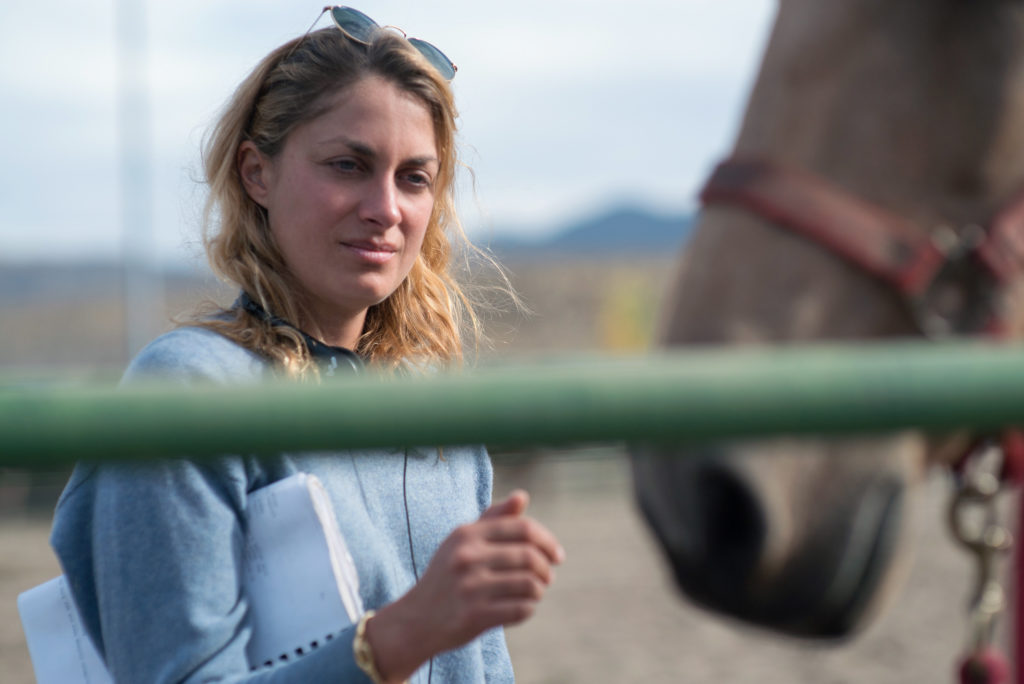To achieve a sense of realism in “The Mustang,” Laure de Clermont-Tonnere spent five years researching the U.S. prison system and animal therapy. Her new film focuses on an inmate, played by Matthias Schoenaerts, in a maximum security prison in Nevada. When he is enrolled in a program that trains wild horses, his life is forever changed.
Clermont-Tonnere credits the film, which she co-wrote and directed, with hard work and an important relationship with the Sundance Institute. She created a short called “Rabbit” which premiered at the Sundance Film Festival in 2015. That film told the story of a correctional facility’s Pet Partnership Program. Shortly after, her script for “The Mustang” won the Sundance Institute/NHK Award, and she was selected for their directing lab.
We talked to Clermont-Tonnere about what she learned from the experience of making a film about the U.S. prison system, how she got “The Mustang” made, and the people she’s met along the way.
“The Mustang” is now playing in select theaters. Clermont-Tonnerre also directed a few episodes of “The Act,” which debuts on Hulu March 20.
W&H: Congrats on your feature directorial debut. What has your experience been as far as being able to get films made and being taken seriously as a female director?
LCT: At an early stage I [received a lot of support from] the Sundance Institute. That made a big difference. Being included by Sundance helped me meet the right people and create the safe environment I needed to create the film. That relationship also really allowed me to deepen my story as well as my research [at San Quentin State Prison]. It was very crucial for my story to be able to go into prisons and do interviews to fill in the details by exploring a similar rehabilitation program. It was a journey of research and creativity. With Sundance by my side, I was also able to bring a producer on board.
W&H: How important is it to you to work with women on the set?
LCT: I had a lot of female support behind the camera. Having female crew members was very important to me. Throughout the long journey of making this film over five years, I’ve been around women who never gave up and always believed in this project. All those women were a great force behind this project.
W&H: Where did the idea for “The Mustang” come from?
LCT: The idea came from an article that I read in France about animal therapy in prison. It was a story about a female convict who bonded with a small white bunny inside her cell. I was very interested in this odd pairing and the very positive impact of this connection, so I decided to research the subject and found a prison in Nevada which trains wild horses. Then I decided to do a feature film about it.
W&H: Which part of the filmmaking process did you enjoy the most — the writing or production?
LCT: I loved writing, although it was pretty painful because it took me a long time. I was overwhelmed by all the research and detail I had to channel into this story. It was also a long process.
But I loved shooting and being out on the set. We set an aggressive schedule with only 23 days. The shoot was very physical, but it was magical to be able to explore those scenes and work with the animals. It also gave us time for improvisations, special moments, and space in the scenes between Matthias and the horse. I was expecting magical accidents and coincidences to happen, and luckily they happened.
W&H: How did you come away feeling about the prison experience and what are your hopes with this film?
LCT: I spent a lot of time with the inmates in prison, observing the different steps of training the horses. I liked that part of the process, and I also liked the fact that because I’m a woman, there was something very safe in telling their stories. The inmates didn’t feel judged and appreciated talking to me. I kept the joy of conversing with them on set [there are former inmates in the cast]. Immersing myself in the research helped me to wrangle, to learn.
I would have not been able to tell this story without every detail. When I really know the subject, I feel freer. I wanted to learn about anger, violence, as well as the trigger of violence and anger, the story of the mustangs, and all the controversy around them.
W&H: Did anyone give you advice for your work on “The Mustang”?
LCT: I had a lot of different mentors during the making of this film. I got a lot of advice from Robert Redford, Ed Harris, and the Michelle Satter [Sundance Institute’s Founding Director].
More generally, I really loved the film “Paris, Texas” by Wim Wenders. That was a film that not only inspired me but also introduced me to a European filmmaker who came to America to make a very American story with a European sensibility. He so wisely used the juxtaposition of a different culture. I love when different cultures blend together in the cinema. It feels very unique. The main character in “Paris, Texas” has a tragic story that made me think creatively about Roman’s [Schoenaerts’ character] tragic story.
W&H: What are you working on next?
LCT: I’m working on adapting a play that I directed on stage 10 years ago. It’s called “Independence,” written by Lee Blessing. It explores a female psychological prison. It’s about a mother with three daughters and she doesn’t want them to leave the house. After exploring a male physical prison, now I’m exploring a female prison and its insanity. I’m very excited, and I can’t wait to dive back into it.







